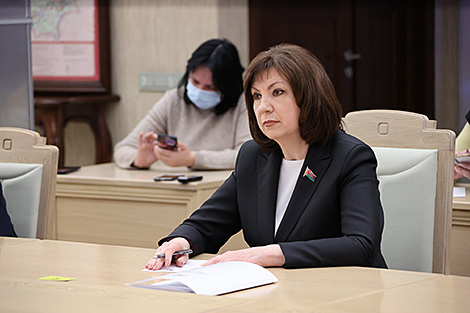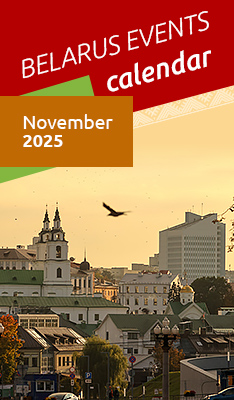Opinions & Interviews
Kochanova: Belarus sticks to principles of good-neighborliness, goodwill

MINSK, 23 November (BelTA) – Belarus has never abandoned the principles of good-neighborliness and goodwill, Chairwoman of the Council of the Republic of the National Assembly Natalya Kochanova said as she met with WHO Regional Director for Europe Hans Kluge, BelTA has learned.
“Members of the Council of the Republic are deeply involved in these issues, like all residents of our country. Indeed, the things that are happening now cannot but worry us. I can assure you that Belarus has always conscientiously fulfilled all international agreements. As soon as this crisis started to unfold in early November, the Council of the Republic took control of the issues related to food supplies and living conditions of the refugees in line with the instructions of the president. After all, there are children, women over there. It is important. We must not leave people in dire straits,” Natalya Kochanova said.
Belarus has never veered away from the principles of good-neighborliness and goodwill. “Belarus is always ready to lend a helping hand, and it stands ready for constructive cooperation aimed at solving the problem,” she said. “But we are tired of these lies and fake news that are pouring into Belarus. Our public associations, the parliamentary corps are outraged by the attitude towards Belarus on the part of European countries. We have repeatedly appealed to all European organizations, to our counterparts, MEPs. But, unfortunately, to be honest, these appeals were not really heard.”
Natalya Kochanova emphasized that Hans Kluge had had an opportunity to see the situation at the border with his own eyes the day before. “We did not create it. But when we saw that people were in such a situation, we had no right to leave them in the cold. We have doctors on standby there. I get daily updates on how the situation is developing, on how many people apply for medical help. More than that, as soon as we learned that some of the refugees were diagnosed with COVID-19, we offered them to get a vaccine. We designated a special place to accommodate the refugees - a logistics center. We organized food supplies. By now, about 70 tonnes of food has already been delivered. We have sent warm clothes, blankets, a shop-on-wheels, an exchange office, a mobile banya so that people can observe basic hygiene. But I will tell you: the situation was terrible in the first few days. We are the people whose mindset was shaped by the legacy of the war. Our parents survived the occupation by the enemy. And when we saw how people were treated at the border, when we saw them being doused by water cannons that sprayed toxic chemicals, when we saw them suffering, we realized that it is at least inhumane,” Natalya Kochanova said.
The speaker emphasized that Belarus has never acted aggressively against other countries and never will. “The memory of the war that took the lives of every third Belarusian is still alive. Thus, we must not allow the outbreak of a new military conflict. What is happening today can lead to this. We are not just concerned about this, we are extremely worried. And this situation is under the control of the president. Our task today is to do everything possible to peacefully resolve the situation. There are 2,000 refugees, so a humanitarian corridor should be created and these people should be let through. Why can't you act humanly? Will these refugees really be such a nuisance? People should not live in such inhuman conditions, they should live a normal life. After all, they are fleeing the war that destroyed their homes, they have nowhere to live. They do not want to stay in Belarus, they want to go to Germany. We will fly home those who agreed to return,” the parliament speaker noted.
Natalya Kochanova added: “We want constructive cooperation without blackmail and pressure, because we are not doing anything illegal. We have lent a shoulder to these people and will do everything to ensure that they have food and a roof over their heads and medical assistance, if necessary. We have made sure that our own people have enough to eat and we will not leave behind those who need our help today.”
In turn, WHO Regional Director for Europe Hans Kluge thanked the Belarusian side for the unhindered access to the logistics hub. “We’ve talked absolutely openly with everyone who works there and stays there. I speak on behalf of the entire team: access was absolutely unhindered for three days. I met with Aleksandr Grigoryevich [Lukashenko] less than a month ago. Back then we both unanimously agreed that healthcare is not a political matter, that everyone deserves healthcare, particularly the most vulnerable groups, including migrants and prison inmates. It is also universally acknowledged that I support Belarus’ membership in the WHO Executive Committee with all my strength,” he remarked.
The WHO regional director for Europe stressed that the most basic needs of the refugees at the border had been satisfied fast such as roof above their heads, food, and hygiene. “I even had an opportunity to talk to doctors and nurses in the ambulance, which is permanently stationed there. Most of the people are indeed vaccinated, others are encouraged to get vaccinated. Since some suffer from chronic diseases, it is very important to continue treatment. I’d like to mention the ability to promptly react to all the incoming information,” he added.
Hans Kluge stated: “Belarus is the only country that has preserved all the strong aspects of the Soviet primary healthcare system and has integrated modern evidence-based medicine approaches into it.”







 print version
print version make home page
make home page add to bookmarks
add to bookmarks

